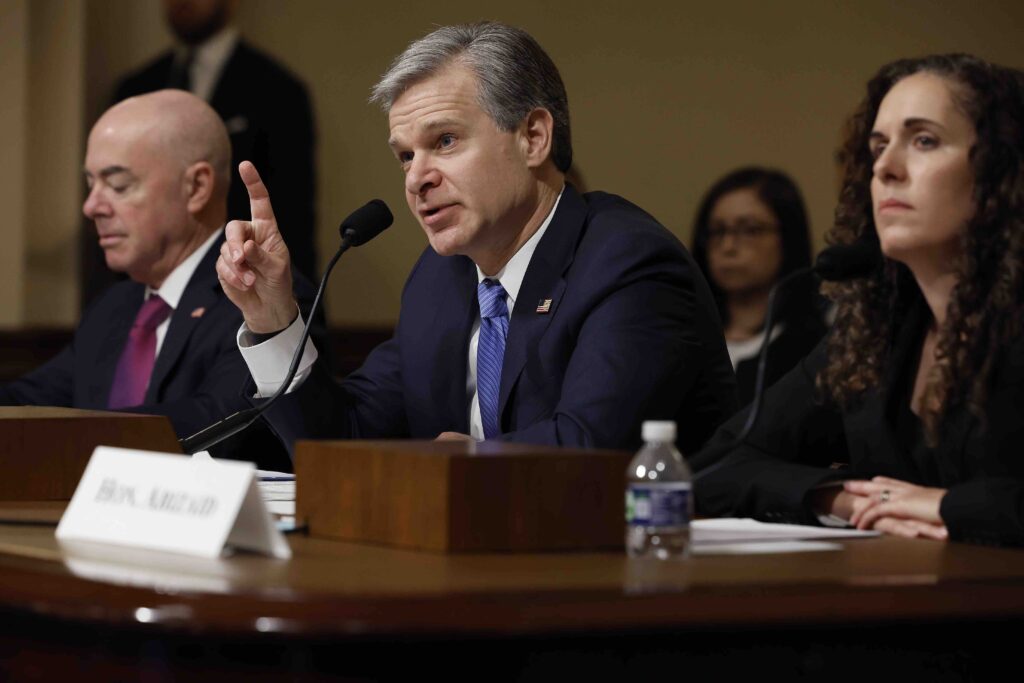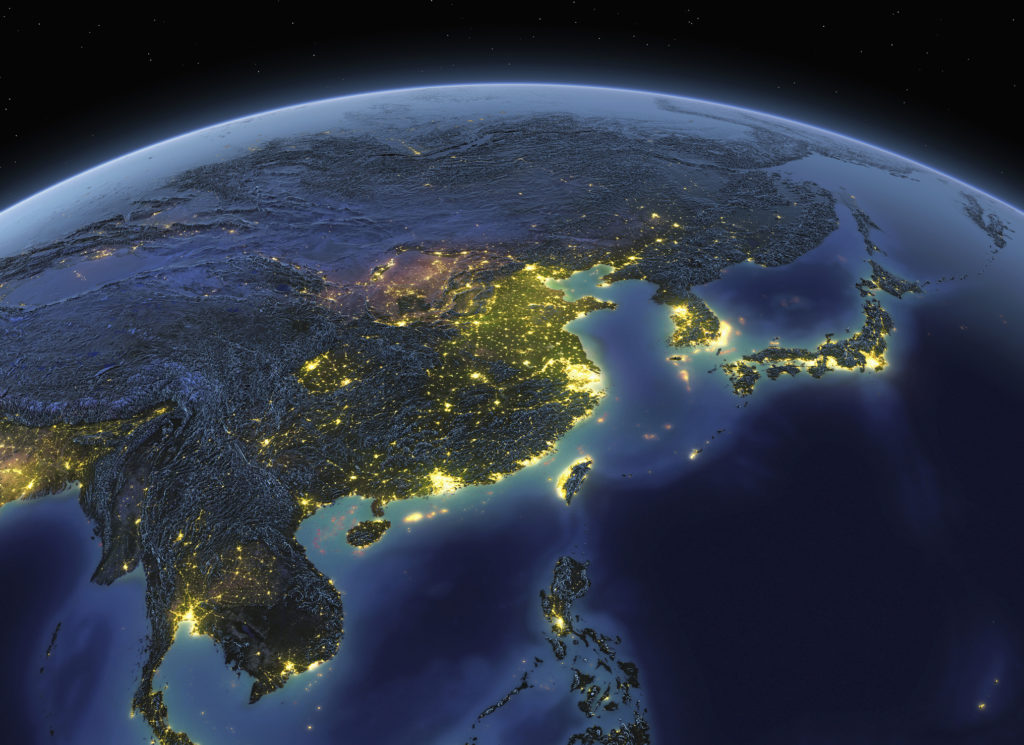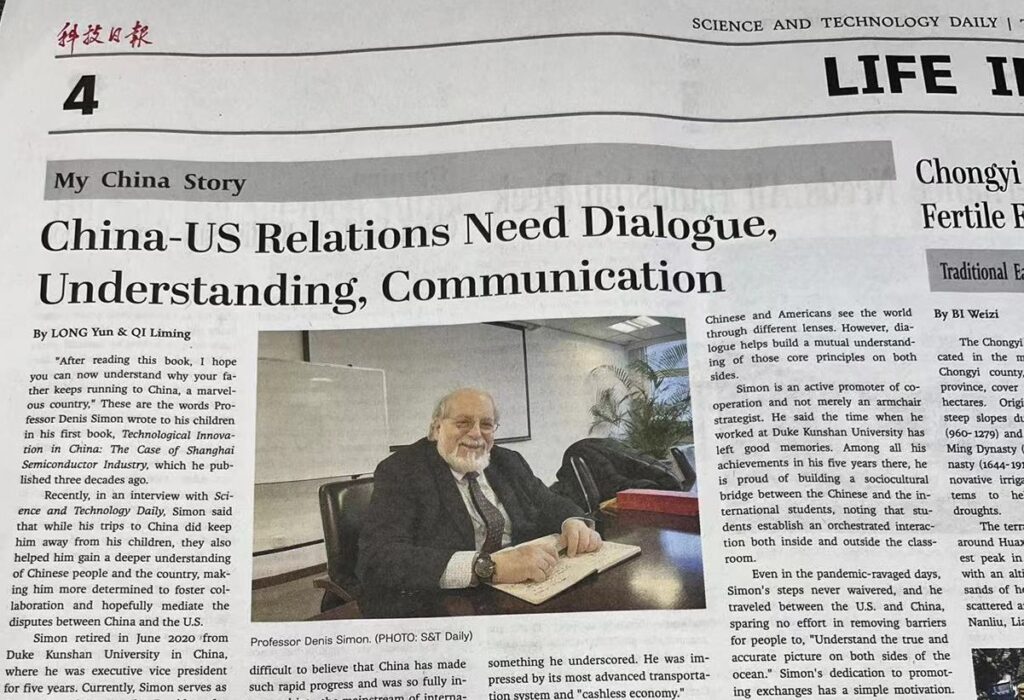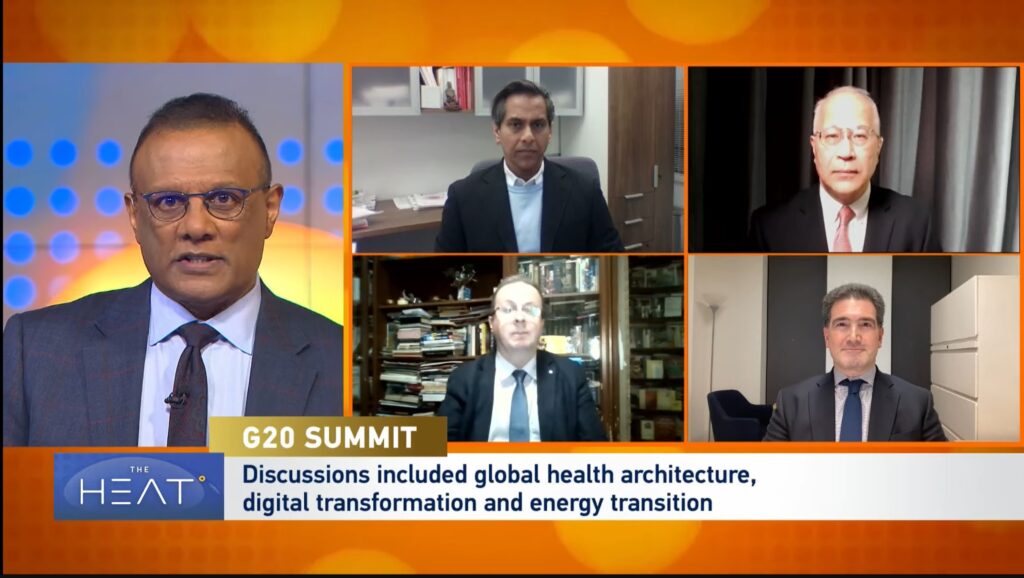
ICAS Bulletin (online ISSN 2836-3418, print ISSN 2836-340X) is published every other week throughout the year at 1919 M St NW, Suite 310, Washington, DC 20036.
The online version of ICAS Bulletin can be found at chinaus-icas.org/bulletins/.
Rebuilding Secure U.S.-China Lines of Communication

– On November 14, on the sidelines of the G20 gathering in Bali, President Biden and President Xi met in person for the first time in five years. They exchanged goodwill gestures, called for calming tensions, resuming talks on climate change, economic stability, and debt relief. Following the meeting, President Biden released a statement stating that Secretary of State Antony Blinken will travel to China in hopes to further reduce tensions.
– U.S. President Biden has vowed that there will be no “new Cold War” with China, following a conciliatory meeting with Chinese President Xi, coming as the pair seek to address global competition and lower tensions.
– Despite their goals of easing tensions, President Biden and President Xi have still offered competing stances on influence in Asia, how to address poverty, and the war in Ukraine; furthering bilateral global competition.
– The U.S. and Chinese heads of defense are looking to meet for the first time since Beijing suspended talks with Washington in Cambodia, indicative of seemingly cooling tensions between the U.S. and China.
– On November 16, Treasury Secretary Janet Yellen attempted to prevent economic conflict with Beijing as she met with China’s Central Bank Governor Yi Gang, resuming economic official meetings for the first time since Speaker Nancy Pelosi’s visit to Taiwan. Governor Yi also discussed global engagements with Secretary Yellen, agreeing to revive normal communications channels and to warn Russia against using nuclear weapons in Ukraine.
– President Xi Jinping has agreed to resume climate change talks with the United States, three months after suspending climate contracts in response to House Speaker Pelosi’s visit to Taiwan.
– On November 15, Xie Zhenhua, climate envoy for China, met U.S. Climate Envoy John Kerry in Egypt at COP27, the United Nations’ annual climate negotiations, where both governments stated that responsibility for climate is not a bilateral issue, and that both sides must work together. Xie encouraged the U.S. to continue bilateral cooperation on climate, emphasizing that the door is always open on the Chinese side for a joint effort to promote COP27 agenda items.
Associated News References:
“US, China defence chiefs likely to meet in sign of thawing ties” The Strait Times, November 21
“Yellen Meets China’s Central Bank Governor as U.S. Seeks to Repair Ties With Beijing” The Wall Street Journal, November 16 [Paywall]
“China’s PBOC Governor, Yellen Had ‘Constructive’ Talk on Economy” Bloomberg, November 15 [Paywall]
“At G20 Summit, Xi and Biden Offer Rival Visions for Solving Global Issues” The New York Times, November 15 [Paywall]
“US, China climate envoys meet at COP27 summit in Egypt” AP News, November 15
“With Tensions Mounting, Biden and Xi Try a Warmer Tone” The New York Times, November 14 [Paywall]
“Xi Biden meeting: US leader promises ‘no new Cold War’ with China” BBC News, November 14
“Biden, Xi Chart Path to Warmer Ties With Blinken China Visit” Bloomberg, November 13 [Paywall]
“China’s top climate official urges US to ‘clear barriers’ to talks” The Guardian, November 9
“US, China Meet for Climate Talks as Xie Says Door Is Open” Business Standard, November 9

– The U.S. Ambassador to Japan has issued a statement that global caution is needed with China and chips, emphasizing the damage that the “wolf warrior” title has done to China.
– During a Senate Homeland Security Committee hearing, in response to a U.S. Senator’s question about the existence of Chinese Communist Party police stations existing in the U.S., FBI Director Christopher Wray said that he is “aware of the existence of these stations” and is “very concerned.” Wray expounded, noting that the existence of such stations “violate sovereignty and circumvent standard judicial and law enforcement cooperation processes.”
– U.S. Vice President Harris said she is to visit a Philippine island while in the area as a “message to the region that the United States is a member of the Indo-Pacific,” in-response to the growing Chinese regional tensions.
– Chinese intelligence officer Yanjun Xu was convicted by a federal jury on grounds of conspiracy to commit economic espionage, trade secret theft. U.S. officials say the case is an example of China’s relentless intelligence operations against American companies.
– China looks to send the outgoing defense minister Wei Fenghe to represent China in the first talks with the U.S. military since Speaker Nancy Pelosi’s trip to Taiwan, looking to address U.S. sanctions against Wei’s successor.
– U.S. intelligence has begun an effort to stop spies and hackers from China from accessing American academic research on emerging technologies, developing new counterintelligence guidelines with academic institutions and federal agencies.
– U.S. President Biden affirms that the U.S.-ASEAN pact is a critical step towards tackling “the biggest issues of our time” as the U.S. looks to equalize its presence with China in ASEAN relations.
– Senior U.S. officials said China is uncomfortable with Russia’s rhetoric and invasion of Ukraine, as preparation for a bilateral discussion looking to aim down global tensions between Washington and Beijing.
– More than 1,000 shipments of solar energy components worth hundreds of millions of dollars have been stagnant at U.S. ports under a new law banning imports from China’s Xinjiang region over concerns of “slave labor.”
Associated News References:
“China Trying to ‘Air Brush’ Over Wolf Warrior Damage, US Ambassador Emanuel Says” Bloomberg, November 20 [Paywall]
“FBI chief says shadowy Chinese police stations in the US are ‘outrageous’ and he’s ‘very concerned,’” Business Insider, November 18
“Kamala Harris to visit Philippine island near China dispute” Nikkei Asia, November 16 [Paywall]
“Court sentences Chinese spy to 20 years for trying to steal U.S. trade secrets” NPR, November 16
“US Advises Academic Researchers on Stopping Chinese Spying” Bloomberg, November 15 [Paywall]
“U.S. Official Says China Is Uncomfortable With Russia’s Rhetoric, Activity in Ukraine” The Wall Street Journal, November 14 [Paywall]
“Biden says U.S.-ASEAN pact to address ‘biggest issues of our time’” Reuters, November 12 [Paywall]
“Exclusive: U.S. blocks more than 1,000 solar shipments over Chinese slave labor concerns” Reuters, November 11 [Paywall]

– U.S. regulators have gained “good access” in their review of auditing work done on New York-listed Chinese firms during a seven-week inspection, moving forward to resolving a long-standing bilateral dispute in economic relations.
– Despite hopes of improved relations following the G20 meeting in Bali, the U.S. Congress still looks to suspend normal trade relations if Beijing does not comply with the World Trade Organization’s market access agreement.
– U.S. auditors continue to investigate U.S.-listed casino businesses in Macau, China, hoping to gain more transparency with the U.S.-listed casinos in Macau.
– Chinese state media has reaffirmed that the Chinese Yuan exchange rate long-term strengthening is here to stay despite the Yuan losing 10.7% against the U.S. Dollar and being set to have its largest annual decline since 1994.
– The U.S. State Department warned European allies any conflicts over Taiwan will trigger a major global economic shock, looking to set up contingency planning amid rising concern about Chinese military action in the Indo-Pacific
– U.S. Secretary of the Treasury Janet Yellen called for stabilizing bilateral relations for economic and global security. Attempting to explain U.S. trade controls to Chinese counterparts at the G20 meeting, she said “it’s not an attempt to completely paralyze China’s economy and stop its development.”
Associated News References:
“U.S. watchdog gained “good access” to audits of Chinese firms -sources” Reuters, November 16 [Paywall]
“Top US-China panel urges halt to normal trade relations if no WTO compliance” South China Morning Post, November 16 [Paywall]
“Macau Under Spotlight Amid U.S. Inspections of China-Based Audits” The Wall Street Journal, November 13 [Paywall]
“Yellen Calls for ‘Stabilizing’ U.S. Relations With China Ahead of G20” The New York Times, November 12 [Paywall]
“China yuan’s long-term strengthening trend will not change – state media,” Reuters, November 11 [Paywall]
“US warns Europe a conflict over Taiwan could cause global economic shock” Financial Times, November 10 [Paywall]

– A state-backed Chinese semiconductor industry conference has called for an “open” and “inclusive” system, coming as chip companies are facing pressure to adhere to the United States bid to isolate China from cross-border supply chains.
– U.S. chipmaker Nvidia reported a 17% year-over-year quarterly revenue decline, citing Washington’s export curbs and Beijing’s zero-COVID policies.
– China has unveiled a new satellite-hunting radar to blunt military advantages provided by satellite intelligence, raising proliferation concerns in Washington and Western allies; citing worry that technology can be exported to U.S. adversaries.
– China’s largest chipmaker, SMIC, has missed their earnings estimate citing U.S. export controls and sanctions from Washington.
– Senator Marco Rubio and Representative Mike Gallagher raised concern in the U.S. Congress over widespread Chinese-owned technology app TikTok calling for a total-ban citing it as a, “major threat to U.S. national security” echoing concerns from FBI Director Christopher Wray who stated that operations of the Chinese-owned TikTok raise national security concerns, citing risk to influence users or control U.S. devices.
– U.S. chipmaker Nvidia offered a new advanced chip in China that meets recent export control rules from Washington, hoping to curb the export restrictions that could cost millions in revenue.
Associated News References:
“China calls for ‘open’ semiconductor system as chip players debate strategies after US export controls” South China Morning Post, November 17 [Paywall]
“Nvidia revenue hit by U.S. chip curbs, China’s zero-COVID policy” Nikkei Asia, November 17 [Paywall]
“U.S. FBI director says TikTok poses national security concerns” Reuters, November 15
“China’s new satellite-hunting radar aims to blind US” Asia Times, November 14
“China Top Chipmaker Misses Earnings Estimates as Sanctions Bite” Bloomberg, November 10
“GOP’s Rubio, Gallagher to Seek TikTok Ban as US Security Threat” Bloomberg, November 10 [Paywall]
“Nvidia offers new advanced chip for China that meets U.S. export controls” Reuters, November 7 [Paywall]

– U.S. security officials did not disclose information about a U.S. warship moving through the Taiwan Strait on November 5, likely looking to avoid provocations with China ahead of the G20 Summit in Bali.
– U.S. General Mark Milley has pledged to support Taiwan, citing the Taiwan Relations Act and urged Beijing to learn from Russia’s invasion of Ukraine. He later said that China’s military is not capable of invading Taiwan for some time and President Xi Jinping would probably conclude that attacking too soon would be “a disaster.”
– U.S. President Biden raised objections towards China’s actions towards Taiwan looking to further U.S. security interests in the region, and has repeatedly indicated the U.S. would defend Taiwan militarily.
– U.S. President Joe Biden looks to address North Korean missile provocations with China’s Xi Jinping in an effort to increase “peace and stability across the entire region.”
Associated News References:
“U.S. kept quiet on warship transit of Taiwan Strait before Biden met Xi” Nikkei Asia, November 20
“China Won’t Be Able to Attack Taiwan in Near Future, US General Milley Says” Bloomberg, November 16 [Paywall]
“Biden objects to China’s ‘aggressive’ approach to Taiwan in three-hour meeting with Xi” CNBC, November 14
“US President Joe Biden will ask China’s Xi Jinping to ‘restrain’ North Korean nuclear ambitions, security adviser says” South China Morning Post, November 12 [Paywall]
“Top US general vows military support for Taiwan, warns Beijing against conflict” South China Morning Post, November 10 [Paywall]
“Top US House Republican Kevin McCarthy vows a hard line on China” South China Morning Post, November 21 [Paywall]
“China tops U.S. to take research crown at global chip conference,” Nikkei Asia, November 21 [Paywall]
“Yellen Encourages Vaccinations in China as Covid Restrictions Slow Growth” The New York Times, November 14 [Paywall]
“China sends more students to US universities than any other nation, survey finds, despite bilateral unease” South China Morning Post, November 14 [Paywall]
“Dozens of Americans Are Barred From Leaving China, Adding to Tensions” The Wall Street Journal, November 13 [Paywall]
“India, Mexico and Southeast Asia will benefit from ‘the great diversification,’” CNBC, November 13
“Wrongly terminated Chinese-American scientist Sherry Chen settles cases for nearly US$2 million” South China Morning Post, November 12 [Paywall]
“India to surpass China in number of US visas issued by 2023” Mint, November 10 [Paywall]
November 18 hosted by Wilson Center
November 17 hosted by Center for Strategic and International Studies
November 17 hosted by Foreign Policy
November 15 hosted by U.S.-China Economic and Security Review Commission
November 23 hosted by Peterson Institute for International Economics
November 29 hosted by Wilson Center
December 5 hosted by Center for Strategic & International Studies
November 30, 2022
9:00am – 10:20 am EDT
Twenty-two months after being sworn into office, and after having declared China to be the “most consequential geopolitical challenge,” President Biden held his first in-person leaders meeting with Chinese President Xi Jinping in Bali, Indonesia. Earlier in mid-October and early-November, President Xi was confirmed to a norm-bending third term in office while President Biden emerged more-or-less politically unscathed from a bruising mid-term election.
At a time when U.S.-China relations continue to tread water, what are the key takeaways of the 20th Party Congress and the Midterm Elections for bilateral ties in 2023? In Bali, did Presidents Biden and Xi manage to set a ‘floor’ beneath their relationship and stabilize ties? Did they achieve the 3Rs — re–establish a baseline of communications; restart dialogue channels; reassure the other of their strategic intentions? How does the centralization of power in President Xi impact the politics of cross-strait relations as well as the timeline of a potential Taiwan Strait conflict? Will the slim but emboldened Republican majority in the House have an impact on the U.S.’ Taiwan policy in 2023-24? To listen to these and other answers to pressing U.S.-China questions, tune in to the event on November 30.
November 15-17, 2022
Seoul, Republic of Korea & Virtual
From November 15-17, ICAS Executive Director Dr. Nong Hong participated in the Seventh International Conference on the Law of the Sea, with a theme of “Law of the Sea for the Next Generation: Effectiveness of UNCLOS Revisited.” While broadcasted online, a majority of the conference was held out of Seoul, Republic of Korea.
Dr. Hong presented in Panel 5: Voices of the Next Generation, speaking on the topic of “China’s Chance to Revisit the Role of UNCLOS in Ocean Governance and Dispute Settlement in the South China Sea.”
By Sourabh Gupta
November 16, 2022
The 20th National Congress of the Communist Party of China, which concluded on Oct 22, officially confirmed China’s shift from high-speed growth to high-quality development, which is a sensible and reassuring strategic policy choice.
Despite the China-US trade war, Washington’s technology crackdown on China, the COVID-19 pandemic and China’s somewhat tense relations with the West to some degrees, China has been focusing on high-quality development. This is to be welcomed. The longer China stays focused on high-quality development, and more egalitarian and sustainable growth, the faster it will become an advanced nation, even though the next 30 years are likely to be very difficult, both geopolitically and economically, for China.
China’s growth over the past decades has been beneficial for the country as well as Asia and the world. China is the world’s largest manufacturer, but still much of what it manufactures gets consumed in the West, including in the European Union and the United States. The next stage is for China to become a significant global consumer, which will provide ballast and stability for the international economic architecture as well as the developed and developing worlds.



On Sunday, November 20, 2022, Senior Fellow Sourabh Gupta discussed the APEC 2022 Summit on CGTN America.
On Thursday, November 17, 2022, Senior Advisor Denis Simon explained in S&T Daily how U,S,-China relations needs dialogue and understanding.
On Wednesday, November 16, 2022 Senior Fellow Sourabh Gupta discussed the G20 leaders meeting in Bali on CGTN’s The Heat.
On Wednesday, November 16, 2022, Senior Fellow Sourabh Gupta quoted by China Daily on the Biden-Xi meeting on the sidelines of the G20.
On Tuesday, November 15, 2022, Senior Fellow Sourabh Gupta discussed the Biden-Xi meeting before the G20 on CGTN America.
On Thursday, November 10, 2022, Research Associate Yilun Zhang was interviewed by PressTV on the current state of U.S.-China bilateral relations.
On Thursday, November 10, 2022, Senior Fellow Sourabh Gupta‘s event video remarks were highlighted by China Daily.
On Sunday, November 20, 2022, Senior Fellow Sourabh Gupta discussed the APEC 2022 Summit on CGTN America.
On Thursday, November 17, 2022, Senior Advisor Denis Simon explained in S&T Daily how U,S,-China relations needs dialogue and understanding.
On Wednesday, November 16, 2022 Senior Fellow Sourabh Gupta discussed the G20 leaders meeting in Bali on CGTN’s The Heat.
On Wednesday, November 16, 2022, Senior Fellow Sourabh Gupta quoted by China Daily on the Biden-Xi meeting on the sidelines of the G20.
On Tuesday, November 15, 2022, Senior Fellow Sourabh Gupta discussed the Biden-Xi meeting before the G20 on CGTN America.
On Thursday, November 10, 2022, Research Associate Yilun Zhang was interviewed by PressTV on the current state of U.S.-China bilateral relations.
On Thursday, November 10, 2022, Senior Fellow Sourabh Gupta‘s event video remarks were highlighted by China Daily.
The ICAS Team is excited to share with our Bulletin readers a project that ICAS has been invited to partner on. Columbia University and Committee of 100 have developed a nationwide survey focused on Chinese Americans, to gather information that will shed light on the status and needs of today’s Chinese American population.
Anyone who identifies as Chinese (regardless of birthplace or citizenship), is 18 years or older, and currently lives in the U.S. can participate. Survey links are also welcome to be shared with anyone who may be interested in taking it.
This is the first survey of its kind that is designed to focus specifically on Chinese Americans, and the survey findings will be used to inform policymakers and the public on policies and programs that can better serve the needs of Chinese American communities across the country.
Your participation, which is completely voluntary, is the most important part of this project, and you are encouraged to take this survey HERE today and make your voice heard!
Note: The survey is available in English, traditional Chinese, and simplified Chinese.
The ICAS Team

The Institute for China-America Studies is an independent nonprofit, nonpartisan research organization dedicated to strengthening the understanding of U.S.-China relations through expert analysis and practical policy solutions.
1919 M St. NW Suite 310,
Washington, DC 20036
icas@chinaus-icas.org
(202) 968-0595
© 2025 INSTITUTE FOR CHINA-AMERICA STUDIES. ALL RIGHTS RESERVED.